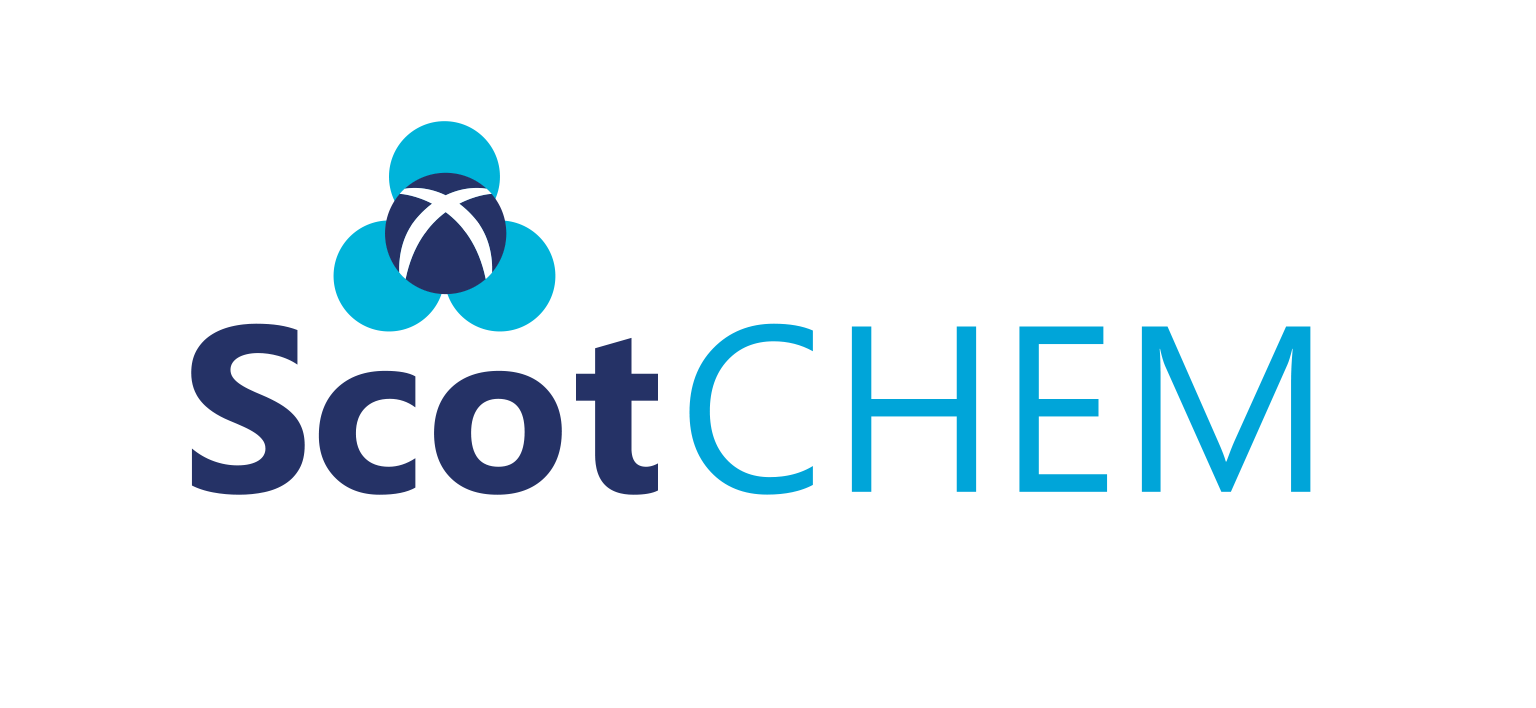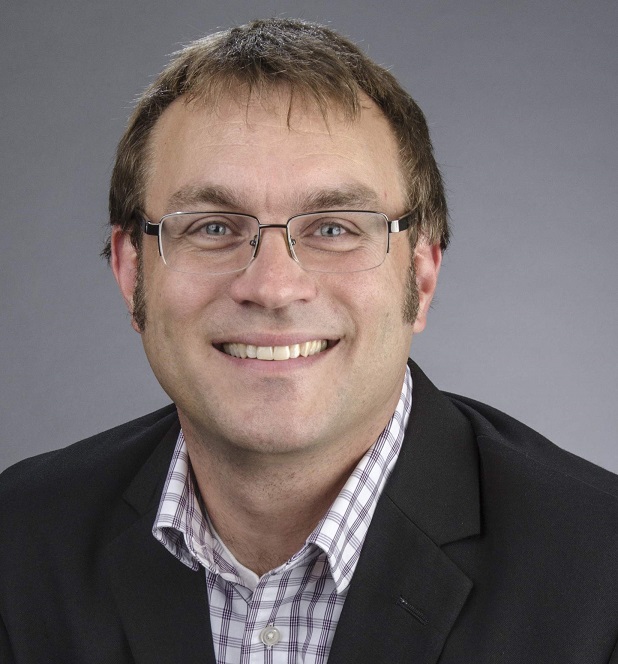 Michael Burkart, University of California, United States
Michael Burkart, University of California, United States
Mike Burkart grew up in Texas and received a B.A. in chemistry from Rice University in 1994. He received a PhD from the Scripps Research Institute in 1999 with Chi-Huey Wong, followed by postdoctoral research at Harvard Medical School with Chris Walsh. He initiated his own research group at UC San Diego in 2002. He is currently Professor of Chemistry and Biochemistry, and his research includes natural product chemical biology and metabolic engineering. Mike is an RSC Fellow and received the OBC Lecture Award in 2010.
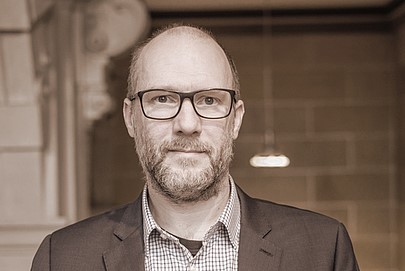 Russell Cox, Leibniz Universität Hannover, Germany
Russell Cox, Leibniz Universität Hannover, Germany
Russell Cox was born in the New Forest in the UK where he grew up. He studied chemistry at the University of Durham, and then worked with Prof. David O'Hagan at the same institution for his Ph.D., studying the biosynthesis of fungal metabolites. Post-doctoral periods with Professor John Vederas FRS in Edmonton Alberta, and Professors David Hopwood FRS and Tom Simpson FRS at Norwich and Bristol in the UK were followed by his appointment as a lecturer in the School of Chemistry at the University of Bristol in 1996, where he rose to become full Professor of Organic and Biological Chemistry in 2009. He moved to become Professor of Microbiological Chemistry at the Leibniz Universität Hannover in Germany in 2013. He has served as an editorial board member of Natural Product Reports until 2012, is currently the chair of the editorial board of RSC Advances (which is the worlds largest Gold open access Chemistry Journal), is a member of the advisory board of RSC Chemical Biology, and has been past chair of the RSC Directing Biosynthesis series of scientific conferences. His research focusses on understanding and engineering the biosynthesis of natural products in fungi.
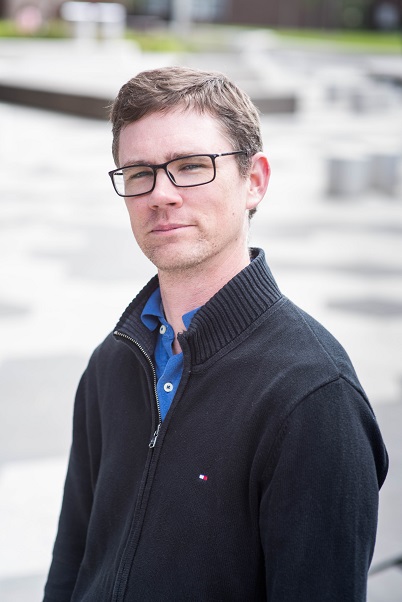 Max Cryle, Monash University, Australia
Max Cryle, Monash University, Australia
A/Prof. Max Cryle is an NHMRC Career Development Fellow and EMBL Australia Group leader based in the Biomedicine Discovery Institute at Monash University. Since 2020, he is also a chief investigator in the ARC Centre of Excellence for Innovations in Peptide and Protein Science. After obtaining his PhD in chemistry from UQ in 2006, he moved to the Max Planck Institute for Medical Research in Heidelberg as a HFSP Cross Disciplinary Fellow. He was subsequently awarded funding from the German Research Foundation to establish his own group to investigate glycopeptide antibiotic biosynthesis as part of the Emmy Noether program: for this work, he was awarded the 2016 Otto Schmeil prize by the Heidelberg Academy of Arts and Sciences. In 2016, he joined EMBL Australia where his group investigates the biosynthesis of important peptide antibiotics and investigates novel strategies and targets for antimicrobial development.
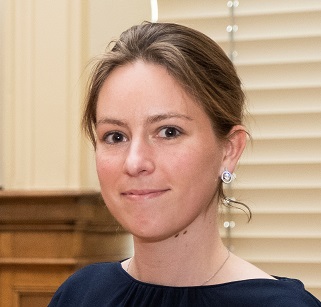 Joleen Masschelein, KU Leuven, Belgium
Joleen Masschelein, KU Leuven, Belgium
Joleen Masschelein obtained a PhD in Bioscience Engineering at KU Leuven (Belgium) in 2015. She was subsequently awarded a Marie-Sklodowska Curie individual postdoctoral fellowship from the European Commission to join the group of Prof. Greg Challis in the Department of Chemistry at the University of Warwick (UK). In 2017, she moved to the Laboratory for Medicinal Chemistry at KU Leuven as a senior postdoctoral research fellow. Since 2020, she is an Assistant Professor at the Department of Biology at KU Leuven and a group leader at the Flanders Institute for Biotechnology. Her team works at the interface of chemistry and biology to discover novel bioactive natural products from host-associated bacteria, elucidate unusual pathways for natural product biosynthesis, unravel the ecological role, biological target and mode of action of natural products, and engineer microbes for the production of novel, industrially relevant natural product derivatives and other therapeutic applications.
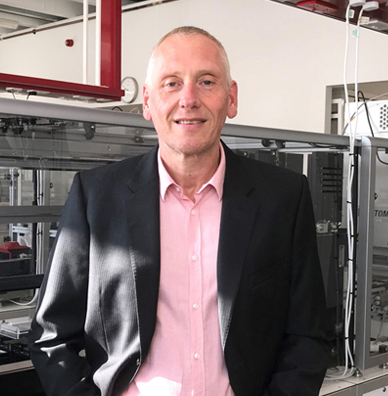 Jason Micklefield, The University of Manchester, United Kingdom
Jason Micklefield, The University of Manchester, United Kingdom
Jason Micklefield graduated from the University of Cambridge in 1993 with a PhD in Organic Chemistry, working with Professor Sir Alan R. Battersby to achieve the first total synthesis of haem d1. Following this, he was awarded a NATO postdoctoral fellowship (1993-1995) to investigate various biosynthetic pathways and enzyme mechanisms within the laboratory of Professor Heinz G. Floss at the University of Washington, USA. In 1995 he was appointed Lecturer in Organic Chemistry at Birkbeck College, University of London, before moving to Manchester in 1998. He was promoted to Professor of Chemical Biology within the School of Chemistry at the University of Manchester in 2008 where his research group is based in the Manchester Institute of Biotechnology (MIB). Jason is also Visiting Professor at the East China University of Science and Technology (ECUST) in Shanghai and Director of the BBSRC funded Natural Products Discovery and Bioengineering Network (NPRONET). He was the recipient of the Natural Product Reports (NPR) lecture award (2008) for his work in biosynthesis.
Jason’s research involves the discovery, characterisation and engineering of biosynthetic pathways to new bioactive natural products, particularly antibiotics. He is also interested in the discovery, structure, mechanism and engineering of enzymes for synthetic applications, including the integration of enzymes with chemocatalysis for telescoping routes to pharmaceuticals and other valuable products. Finally, his lab also developed the first orthogonal riboswitches and is currently developing new genetically encoded biosensors.
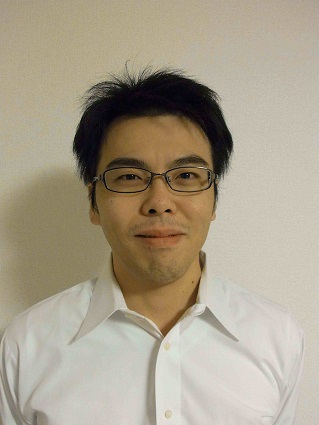 Atsushi Minami, Hokkaido University, Japan
Atsushi Minami, Hokkaido University, Japan
Atsushi Minami received his Ph.D. in 2007 from Tokyo Institute of Technology under the direction of Professor Tadashi Eguchi. He worked as a postdoctoral fellow with Prof. Tohru Dairi at Toyama Prefectural University in 2007. He was appointed Assistant Professor at Hokkaido University and then Associate Professor in 2015. He is a recipient of the Chemical Society of Japan Award for Young Chemists (2016). His present research focused on the biosynthesis of natural products and biochemical analysis of biosynthetic enzymes, especially focusing on fungal polyketides, terpenoids, and peptides.
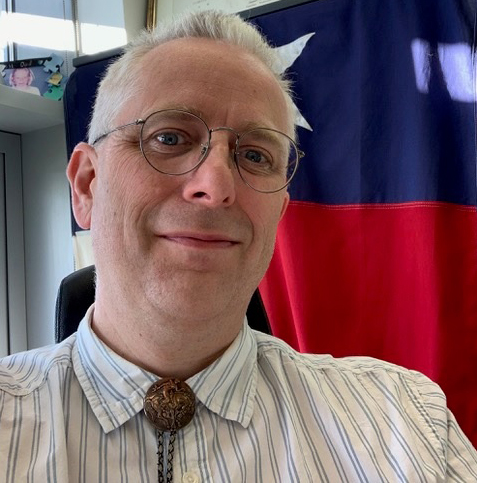 James Naismith, University of Oxford & Rosalind Franklin Institute, United Kingdom
James Naismith, University of Oxford & Rosalind Franklin Institute, United Kingdom
Jim Naismith was born in 1968 and studied Chemistry at the University of Edinburgh, graduating in 1989. Inspired by Steve Chapman he sought to apply a chemical training to biological problems. As a Carnegie Scholar he moved to Manchester University to study with Bill Hunter, Dave Garner and John Helliwell earning a PhD in 1992. Following a two year NATO fellowship in the lab of Steve Sprang at University of Texas Southwestern Medical Centre he returned to the UK and a lectureship in Chemistry at St Andrews starting 1 Jan 1995. Over the next twenty two years he worked at St Andrews with a talented and changing group of students, technicians and post-docs on the structure and function of proteins that make natural products. He was promoted to Reader in 1999, Professor in 2001 becoming the Bishop Wardlaw Professor of Chemical biology in 2014 and graduating with a DSc in 2016. In 2017 he moved to head the Research Complex at Harwell and a chair at Oxford; he is now the Director of the new Rosalind Franklin Institute. Research highlights have included the complete description of the biosynthesis of dTDP-L-rhamnose, the enzymes of the patellamide biosynthetic cluster, halogenating enzymes, the first alpha helical outer membrane protein (that transports sugars across the membrane), amide methylating enzyme and the basis for mechanosensing in bacteria. The research by his co-workers has been recognised by multiple awards (Knowles, Corday-Morgan, Dextra, Colworth) and election to fellowships (FRSE, FMedSci, FRS).
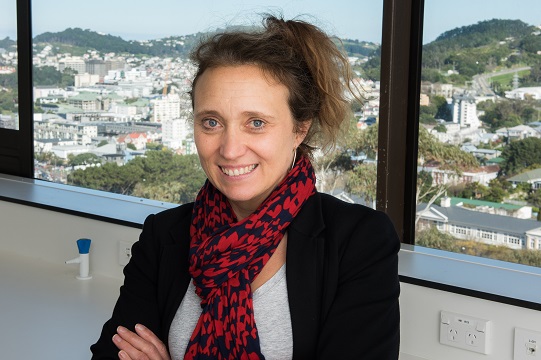 Emily Parker, Victoria University of Wellington, New Zealand
Emily Parker, Victoria University of Wellington, New Zealand
Emily completed her undergraduate degree in organic chemistry at the University of Canterbury, New Zealand, and her PhD in bio-organic chemistry at the University of Cambridge with Chris Abell. Following a postdoctoral fellow at the University of Cambridge, she returned to New Zealand to Massey University initially, and moved to the University of Canterbury in 2006. In 2017 she moved to Victoria University of Wellington to take up a position as Professor of Chemical Biology within the Ferrier Research Institute.
In 2005 she was awarded the New Zealand Institute of Chemistry Easterfield medal. In 2006 She was awarded the Applied Biosystems Award by the New Zealand Society for Biochemistry and Molecular Biology in 2008, and in 2010 Emily received a National Teaching Award for Sustained Excellence in Tertiary Teaching. She is a Deputy Director of the Maurice Wilkins Centre for Molecular Biodiscovery.
Emily’s research area spans the areas of chemistry and biology and involves a range of research techniques including natural product biosynthesis, protein evolution and engineering, and molecular and structural biology. More recently her research group has focused on exploring molecular communication processes and using synthetic biology approaches to biosynthesise and manufacture and bioactive compounds.
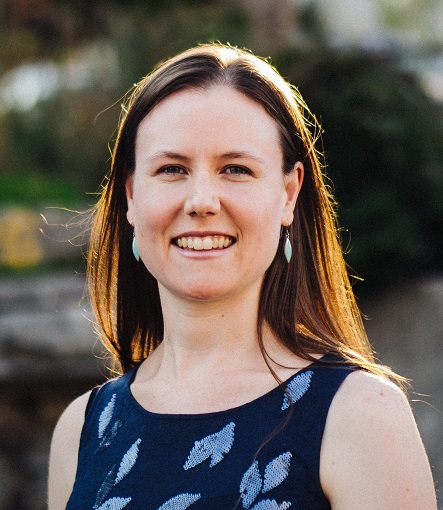 Avena Ross, Queen's University, Canada
Avena Ross, Queen's University, Canada
Avena Ross was raised in New Zealand where she attended the University of Auckland and obtained her BSc (Hons.) in Chemistry in 2005. She completed her PhD under the supervision of Prof. John Vederas, at the University of Alberta, where she studied lanthipeptides and their analogues. In 2012 she joined the lab of Prof. Brad Moore at the Scripps Institution of Oceanography/UCSD as an NSERC Postdoctoral fellow. At Scripps her work focused on the biosynthesis of non-ribosomal peptides in marine Proteobacteria. In January 2015, she began her current position as an Assistant Professor and Queen’s National Scholar in Chemical Biology and Medicinal Chemistry at Queen’s University, Canada. The Ross group uses a multidisciplinary approach to investigate marine bacteria as a source for new bioactive molecules and seeks to understand the methods used by bacteria to enzymatically construct these complex molecules.
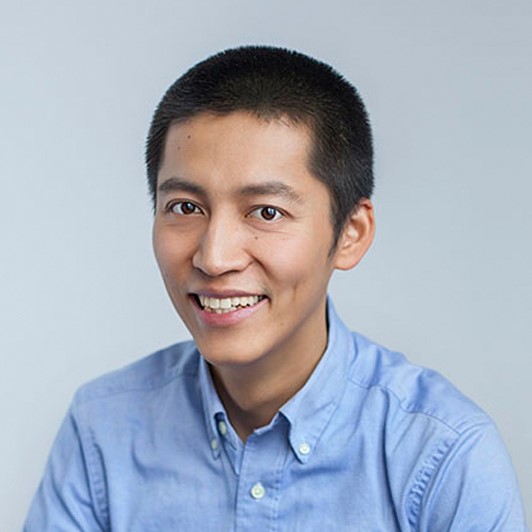 Jing-Ke Weng, Massachusetts Institute of Technology, United States
Jing-Ke Weng, Massachusetts Institute of Technology, United States
Jing-Ke Weng received his B.S. (2003) in Biotechnology from Zhejiang University and his Ph.D. (2009) in Biochemistry from Purdue University. He was a Pioneer postdoctoral fellow at the Salk Institute for Biological Studies and Howard Hughs Medical Institute between 2009 and 2013. Currently he is a member of the Whitehead Institute for Biomedical Research, and an Associate Professor of Biology at Massachusetts Institute of Technology. Dr. Weng's research focuses on understanding the origin and evolution of plant specialized metabolism at enzyme, pathway, and systems levels, as well as how plants exploit discrete small molecules to interact with their surrounding biotic and abiotic environments. Through synthetic biology and metabolic engineering approaches, he develops new biotechnologies for producing high-value natural products in a sustainable manner. Dr. Weng has won numerous awards in his career, including Beckman Young Investigator (2016), Alfred P. Sloan Research Fellow (2016), Searle Scholar (2015), Pew Scholar in the Biomedical Sciences (2014), American Society of Plant Biologists Early Career Award (2014), and Tansley Medal for Excellence in Plant Science (2013).
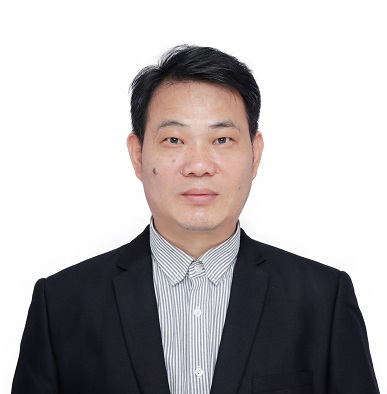 Changsheng Zhang, South China Sea Institute of Oceanology, China
Changsheng Zhang, South China Sea Institute of Oceanology, China
Changsheng Zhang has obtained his B.E. from Shanghai Jiao Tong University in 1994, M.E. from East China University of Science and Technology in 1997, and Ph.D from Wuppertal University with Prof. W. Piepersberg, Germany, in 2002, where he studied acarbose biosynthesis. Then he carried out postdoctoral studies from 2003 to 2008 in University of Wisconsin-Madison with Prof. Jon Thorson, where he mainly worked on functional characterization of natural product glycosyltransferases. He has been the Professor of South China Sea Institute of Oceanology-CAS since 2008. He has been in Prof. Shu-Ming Li’s lab (Marburg, 2013 and 2014) and Prof. Yi Tang’s Lab (UCLA, 2017) as a visiting scholar. His researches are focused on the discovery, biosynthesis, and structural diversification of marine microbial natural products, with a focus on the polycyclic compounds. He has published more than 100 original papers, including Science, Nature Biotechnology, Nature Chemical Biology, Nature Communications, Molecular Cell, JACS, Angewante Chemie, Chemical Science, etc. He is now an Editorial Board member of Natural Product Reports, and is also on the Editorial board of Molecules in Natural Products Chemistry Section.
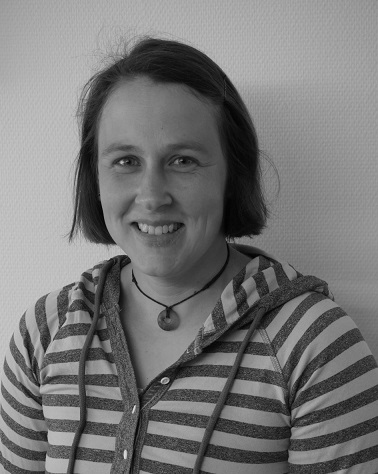 Jennifer Andexer, University of Freiburg, Germany
Jennifer Andexer, University of Freiburg, Germany
Jennifer Andexer studied Biology at the University of Duesseldorf. After her diploma, she carried out her doctoral research working on novel hydroxynitrile lyases at the Institute of Molecular Enzyme Technology (University of Duesseldorf/Research Centre Juelich) in the groups of Thorsten Eggert, Karl-Erich Jaeger and Martina Pohl. In 2008, she moved to the labs of Joe Spencer, Finian Leeper and Peter Leadlay at the University of Cambridge, where she worked on enzymes from biosynthetic pathways of different natural products. She has been head of the Chemical Biology group at the Institute of Pharmaceutical Sciences at the University of Freiburg since 2011, and works on the characterisation of cofactor-dependent enzymes, cofactor regeneration systems and cofactor analogues. In 2020, she was appointed Heisenberg Professor of Pharmaceutical and Medicinal Chemistry. She is a principal investigator in the RTG 1976 (DFG), an ERC starting grant project and was awarded the Heinz Maier-Leibniz Prize of the DFG in 2018.
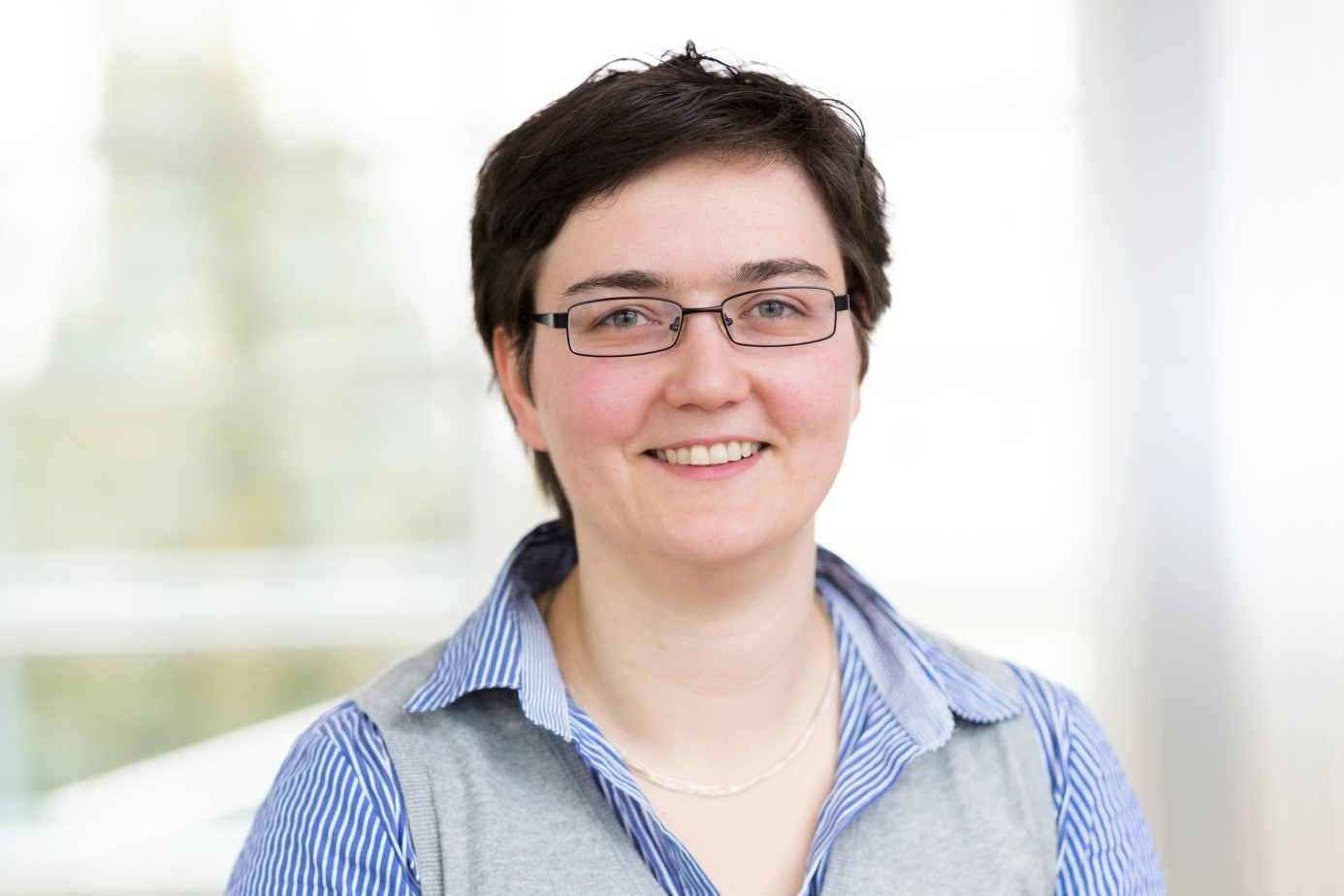 Christine Beemelmanns, Leibniz Institute, Germany
Christine Beemelmanns, Leibniz Institute, Germany
Dr. Beemelmanns studied Chemistry at the RWTH Aachen. She then went to Japan for a one year research stay in the group of Prof. Sodeoka at RIKEN. Back in Germany she worked at the FU Berlin with Prof. Reißig and received her PhD in Organic Chemistry. She then worked another six month in Japan at the University of Tokyo under the supervision of Prof K. Suzuki and joined shortly afterwards the group of Prof. Clardy at Harvard Medical School (Boston) in 2011. End of 2013, she received a call from the Hans-Knöll Institute (HKI) to work there as a Junior Research Group leader in the field of Natural Products Chemistry and Chemical Biology. Her research combines different aspects of chemical ecology and organic and natural product chemistry and aims to chemically and functionally characterize microbial signaling and defense molecules in different model systems. By analyzing ancient and evolved microbial interactions, unprecedented chemical core structures with potential pharmaceutical application are likely to appear.
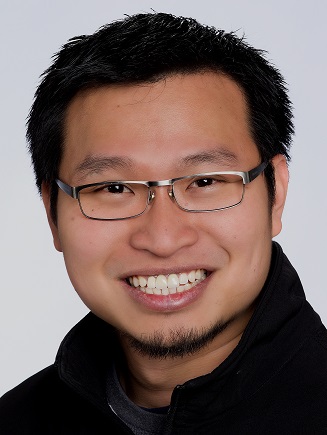 Yit-heng Chooi, University of Western Australia, Australia
Yit-heng Chooi, University of Western Australia, Australia
Dr Yit-Heng (Heng) Chooi completed his PhD at the RMIT University in Melbourne, Australia. He then worked with Prof Yi Tang at University of California, Los Angeles (2009-2013) focusing on the molecular genetics and biochemical basis of secondary metabolite biosynthesis in fungi. He moved back to Australia in 2013 to take up an ARC Discovery Early Career Researcher Award (DECRA) at the Research School of Biology, Australian National University in Canberra. There, he focused on uncovering the biosynthesis of hidden secondary metabolites encoded in the genomes of fungal plant pathogens and their contribution to plant disease development. In 2015, he moved to the beautiful sunny Perth in Western Australia and joined the faculty at the School of Chemistry & Biochemistry (now School of Molecular Sciences) in The University of Western Australia (UWA). Dr Chooi was awarded the prestigious ARC Future Fellowship in 2016 to continue his research in the interdisciplinary field. His current research is focusing on understanding secondary metabolite biosynthesis of fungi, the roles of secondary metabolites in plant and animal fungal pathogen-host interactions, and enzyme and natural product discovery by genome mining.
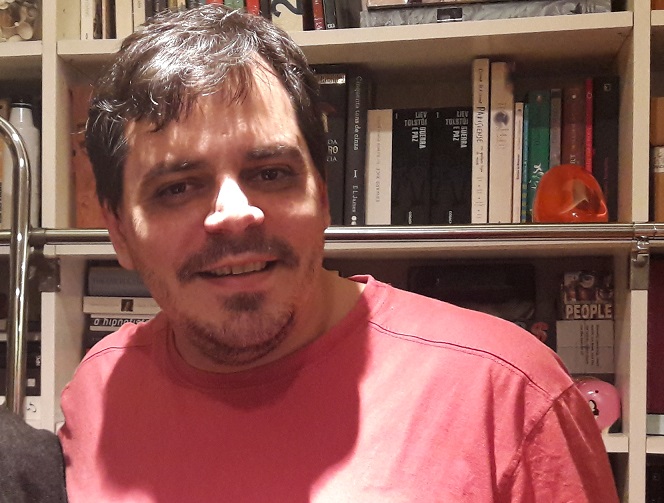 Marcio Dias, University of Warwick, United Kingdom
Marcio Dias, University of Warwick, United Kingdom
Marcio received his B.S in Biology from the University of State of São Paulo, Brazil in 2004 and his Ph.D. in Molecular Biophysics from the Department of Physics from the same University in 2007. Still, in 2007, he moved to the UK to start a Post Doctoral training at the Laboratory of Prof. Sir Tom Blundell, Department of Biochemistry from the University of Cambridge. His project aimed to apply protein crystallography in fragment-based drug discovery approaches, and the understanding of enzymes from natural product biosynthesis in collaboration with Prof. Cris Abell and Dr. Joe Specer, respectively. In 2011, he moved back to Brazil to hold a Yong Research fellowship from FAPESP to start his independent career at the National Laboratory of Bioscience (LNBio, Campinas). In 2014, he was appointed as an Assistant Professor at the Department of Microbiology in the Institute of Biomedical Science from the University of São Paulo. In 2018, he was appointed as an Assistant Professor at the Department of Chemistry, the University of Warwick. In 2021, he moved back to the University of São Paulo, although still holds a link with the University of Warwick as an honorary associate professor. His research interests include applying fragment-based drug discovery to key targets from Mycobacterium and exploring structures of relevant enzymes from natural product biosynthesis, particularly those from aminoglycosides and polyketides.
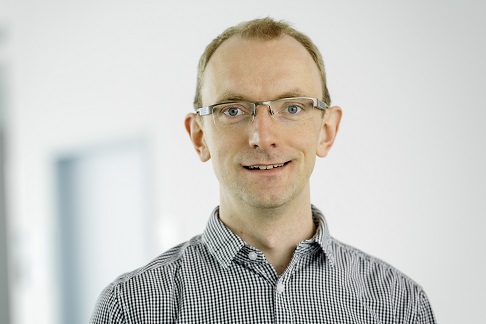 Hajo Kries, Leibniz-HKI, Germany
Hajo Kries, Leibniz-HKI, Germany
Hajo Kries obtained his degrees in Biochemistry (BSc) from the University of Geneva and in Chemistry (MSc) from ETH Zurich (Switzerland). He received a PhD in Chemistry from ETH Zurich for his work in the lab of Donald Hilvert on enzyme design and engineering. For his PhD thesis, he was awarded the ETH medal and the Friedrich-Weygand-Prize. In Sarah E. O’Connor’s lab at the John Innes Centre (Norwich, UK), he worked on the enzymology of iridoid biosynthesis as an SNF and Marie Skłodowska-Curie post-doctoral fellow. In 2016, he became leader of the junior research group Biosynthetic Design of Natural Products at the Leibniz Institute for Natural Product Research and Infection Biology (HKI) in Jena (Germany). With the aim to develop tailor-made natural products, he is currently investigating engineering methods for nonribosomal peptide synthetases. His group combines synthetic biology, nanobiotechnology, and promiscuity-guided directed evolution methods to reprogram nonribosomal enzymes.
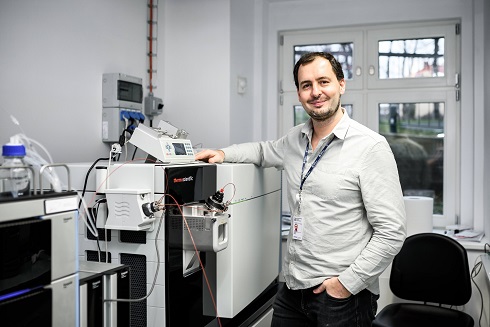 Tomáš Pluskal, Institute of Organic Chemistry and Biochemistry, Czech Republic
Tomáš Pluskal, Institute of Organic Chemistry and Biochemistry, Czech Republic
Tomáš Pluskal obtained his MSc in Computer Science from the Charles University in Prague in 2004. After his graduation he moved to Japan and pursued research in fission yeast metabolomics at the Okinawa Institute of Science and Technology. His name is well recognized in the metabolomics community owing to the popular MZmine platform for mass spectrometry data processing, which he developed. Tomáš received his PhD in Molecular Biotechnology from Hiroshima University in 2014. During his postdoctoral research at the Whitehead Institute for Biomedical Research he elucidated the biosynthetic pathway of psychoactive molecules called kavalactones in a non-model plant kava (Piper methysticum). In 2020 Tomáš returned to Prague and currently he is running a new lab at the Institute of Organic Chemistry and Biochemistry of the Czech Academy of Sciences. In his own lab, he aims to combine the expertise from computer science and biochemistry and find novel high-throughput methods for characterizing specialized metabolic pathways in plants.
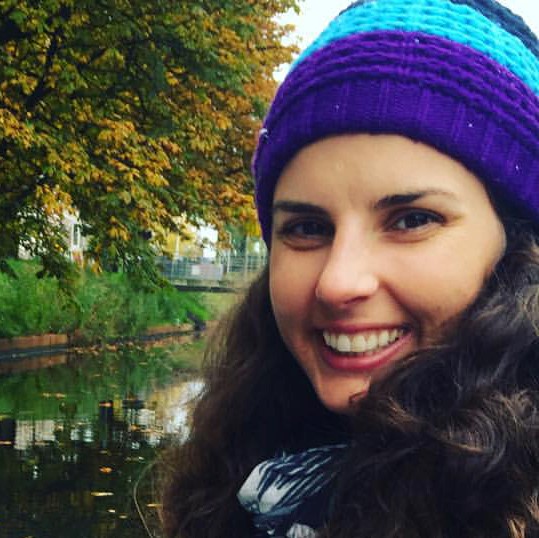 Anna Vagstad, ETH Zurich, Switzerland
Anna Vagstad, ETH Zurich, Switzerland
Anna earned a PhD in Chemical Biology from Johns Hopkins University in 2012 where she studied the biosynthetic programming of fungal polyketide synthases under Prof. Craig Townsend. In 2013, she moved to Switzerland and received an ETH Zurich Postdoctoral Fellowship to study in the lab of Prof. Jörn Piel in the Institute of Microbiology at ETH Zurich. Her research focused on peptide-modifying radical S-adenosyl methionine enzymes. She continues as a senior scientist in the Piel group, pursuing projects on bacterial ribosomally synthesized and post-translationally modified peptide natural products. Anna has a keen interest in the discovery of novel pathways and enzymes, elucidating their mechanistic details and exploiting their use as tools in peptide engineering. In 2020, she was awarded a Novartis FreeNovation grant.
 Coran Watanabe, Texas A&M University, United States
Coran Watanabe, Texas A&M University, United States
Dr. Watanabe received her B.S. degree in Chemistry from the University of Hawaii, Manoa.She obtained her Ph.D. degree with Dr. Craig Townsend at The Johns Hopkins University and followed with postdoctoral research with Dr. Peter Schultz at the University of California, Berkeley and The Scripps Research Institute.She began her faculty position at Texas A&M University Department of Chemistry in 2002.She has received a number of awards including a Research Corporation Innovation Award, a Rising Star ACS PROGRESS, Dreyfus Lectureship Award, and an American Cancer Society Research Scholar Award.
Nature and in particular natural products inspire the research interests of her laboratory, after all >50% of all small molecule drugs on the market are natural products or derived from natural product leads.At Texas A&M University, she has established a multidisciplinary natural products research program, which is supported by several project directions: [1] Biosynthesis of the azinomycin class of anti-tumor agents, [2] Lipofuscins in age-related macular degeneration (AMD), [3] Marine natural product drug development, [4] Neurospora Crassa/Ergothionene Supplementation.
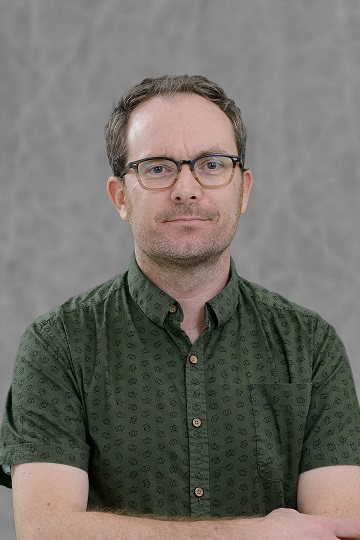 Gavin Williams, North Carolina State University, United States
Gavin Williams, North Carolina State University, United States
Dr. Williams received his B.Sc. with First Class Honors from the University of Wales at Aberystwyth (1998) and a Ph.D. in chemical biology from the University of Leeds, England (2002). He then completed postdoctoral research at the University of Leeds with Prof. Adam Nelson (chemistry) and Prof. Alan Berry (molecular and structural biology) where he created tailored aldolase enzymes for the synthesis of sugars. He then moved to the University of Wisconsin at Madison as a research scientist with Prof. Jon Thorson where he engineered enzymes involved in natural product glycosylation. He has been at NC State University since 2009 where his research group uses protein engineering, metabolic engineering, and synthetic biology to reprogram the biosynthesis of secondary metabolites, including polyketides and terpenes. Dr. Williams received the NSF Career Award in 2012, the 2014 Sigma Xi Research Award, was named a University Faculty Scholar in 2015, is a member of the Comparative Medicine Institute at NC State, and in 2019 was named a LORD Corporation Distinguished Scholar. He served as the Associate Head since 2018 and was appointed Interim Department Head in 2021
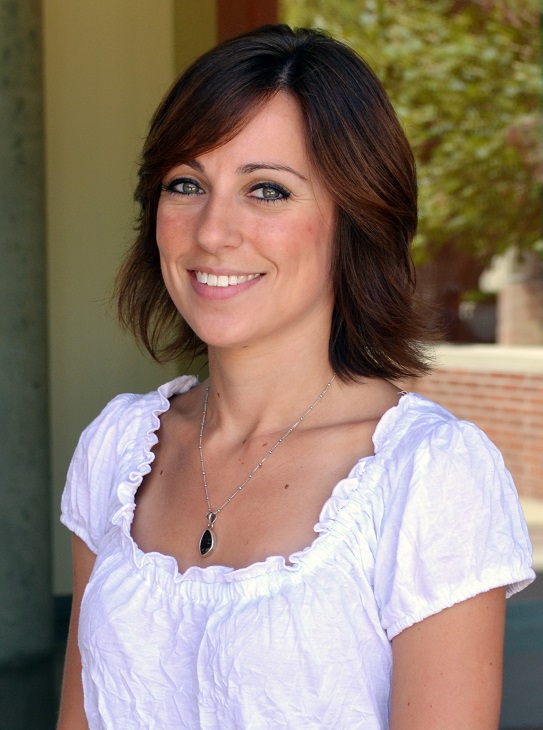 Jaclyn Winter, University of Utah, United States
Jaclyn Winter, University of Utah, United States
Jackie Winter obtained her B.S. in Chemistry and Molecular Genetics from the State University of New York College at Fredonia and obtained her Ph.D. in Marine Natural Product Biosynthesis under the guidance of Professor Bradley Moore at Scripps Institution of Oceanography. Her dissertation focused on elucidating the biosynthesis of halogenated natural products isolated from marine-derived actinomycete bacteria. As a graduate student, she was awarded a predoctoral Marine Biotechnology Ruth L. Kirschstein National Research Service Award, as well as the Claude ZoBell fellowship award. After graduate school, Jackie carried out a postdoctoral appointment with Professor Christian Hertweck at the Hans Knöll Institute and Leibniz Institute for Natural Product Research and Infection Biology in Jena, Germany where she isolated and characterized bioactive natural products from filamentous fungi. For her second postdoctoral appointment, Jackie joined the laboratory of Professor Yi Tang at UCLA where she explored the biosynthesis of fungal polyketides and developed techniques to manipulate these biosynthetic systems in order to expand their natural product capabilities. While at UCLA, she was awarded the L’Oréal/AAAS USA postdoctoral fellowship for Women in Science. In 2015, Jackie joined the Medicinal Chemistry Department as an Assistant Professor in the College of Pharmacy at the University of Utah. Her current research is focused on exploring the biomolecular chemistry of natural products produced by filamentous fungi and actinomycete bacteria with the goal of using these use these organisms as resources for the discovery and development of new antibiotic agents.


























